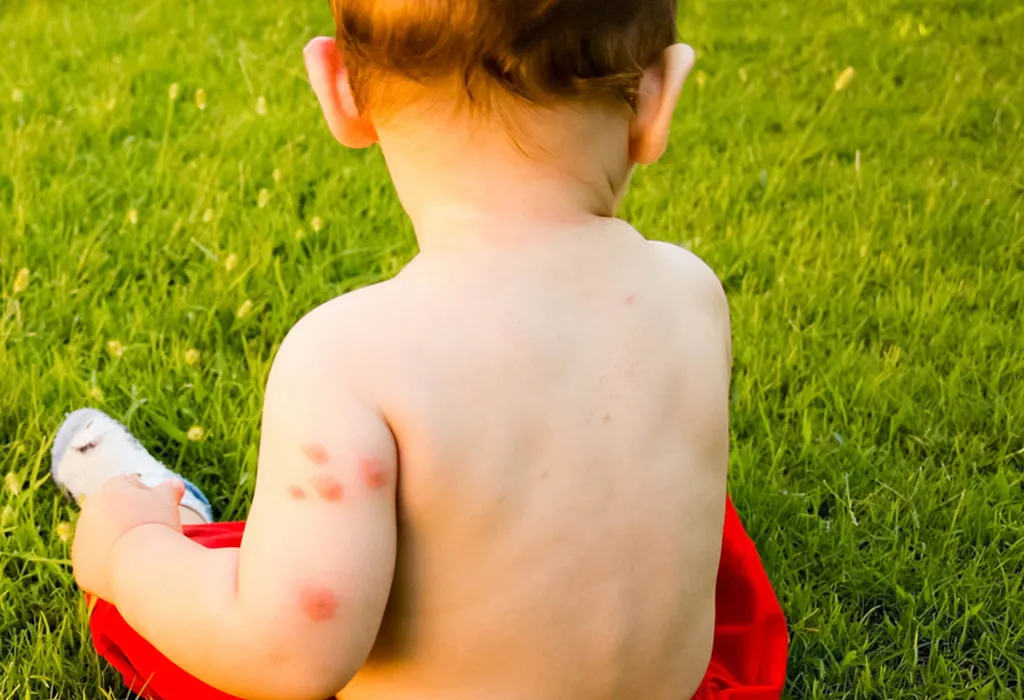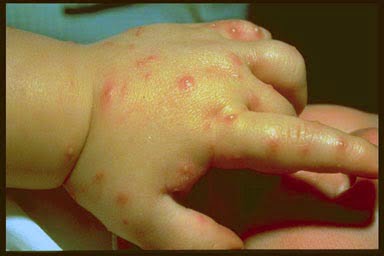If an ant bites your baby, immediately clean the bite area and apply a cold compress to reduce swelling. It’s important to monitor for any signs of an allergic reaction and seek medical attention if necessary.
When a tiny ant bite disrupts your baby’s peace, it can be distressing for both you and your little one. As a caring parent, your quick actions can alleviate discomfort and prevent any potential complications. Ant bites on babies can cause redness, swelling, and itching, making your baby restless.
By following some simple steps, you can effectively manage the situation and provide relief for your baby. Let’s explore how to properly address and treat ant bites on babies to ensure your baby’s comfort and well-being.

Credit: parenting.firstcry.com
Recognizing Ant Bites
When it comes to protecting our little ones, it’s essential to be able to recognize ant bites and know what steps to take. Identifying ant bites can help us provide the right care for our babies and ease their discomfort. Here, we’ll explore the symptoms and identification of ant bites in babies, ensuring we can take swift action when needed.
Symptoms Of Ant Bites
Ant bites can cause various symptoms in babies, and being able to recognize these signs can help us address the issue effectively. Look out for the following symptoms:
- Redness and Swelling: Ant bites often result in localized redness and swelling around the affected area. These areas may also feel warm to the touch.
- Itching and Discomfort: Babies may experience itching and discomfort at the site of the ant bite. They may try to scratch the area or display signs of irritability.
- Pain: Ant bites can be painful for babies, causing them to cry or show signs of distress.
- Formation of Blisters: In some cases, ant bites may lead to the formation of small blisters around the bitten area. These blisters may fill with fluid and eventually break.
Identification Of Ant Bites
Properly identifying ant bites is crucial for providing appropriate care. Here are some ways to identify ant bites on your baby:
- Multiple Bites: Ant bites often occur in clusters or lines, indicating that your baby may have been bitten by a group of ants.
- Location: Ant bites are commonly found on exposed areas of the body, such as the arms, legs, and face.
- Visible Entry Points: Ants leave behind tiny entry points on the skin, resembling small puncture marks. These marks may be surrounded by redness or swelling.
If you notice any of these symptoms or identification markers on your baby’s skin, it’s important to take appropriate action to alleviate their discomfort and prevent any further complications.
:max_bytes(150000):strip_icc()/FireAntBite-9f9561b55155424b997d2bbb6cbccc7a.jpg)
Credit: www.health.com
Immediate First Aid
If your baby gets bitten by ants, it is crucial to provide immediate first aid to alleviate any discomfort and prevent further complications. Here are the steps to take:
Washing The Area
- Gently clean the affected area with mild soap and cool water.
- Avoid scrubbing the bite, as it may aggravate the skin.
- Pat the area dry with a soft towel.
Cold Compress Application
- Place a cold compress or ice pack wrapped in a cloth on the bite area.
- Hold the compress for 10-15 minutes to reduce swelling and pain.
- Never place ice directly on the skin to prevent frostbite.
Managing Pain And Itching
When a baby is bitten by ants, it can cause pain and itching. Here are some tips to manage these discomforts:
Use Of Medicinal Creams
Applying medicinal creams like calamine lotion or anti-itch cream externally can help reduce itching and soothe the affected area.
Giving Oral Antihistamines
Administering oral antihistamines can relieve itching and pain from within. It is important to follow the recommended dosage for babies.

Credit: www.shutterstock.com
When To Seek Medical Help
If your baby is bitten by ants, watch for signs of infection or severe pain. If your baby develops blisters, widespread hives, or pus at the bite site, seek medical help from a doctor. Medical advice should also be sought if the pain persists and an oral antihistamine or acetaminophen may be recommended to relieve discomfort.
Signs Of Infection
If your baby experiences ant bites, it’s important to monitor the affected area for any signs of infection. Signs of infection may include pus, increasing pain, heat, or redness at the site of the ant bite. If you notice any of these symptoms, it’s crucial to seek medical help immediately. Infections can be dangerous for infants, as their immune systems are still developing. Treating the infection promptly can prevent further complications and ensure your baby’s well-being.Persistent Pain Or Symptoms
While ant bites generally cause mild discomfort and itchiness, persistent pain or symptoms may indicate a more severe reaction. If your baby experiences ongoing pain that doesn’t seem to subside or if the ant bite symptoms worsen over time, it’s essential to seek medical help. Your healthcare provider can assess the severity of the reaction and determine the best course of action to alleviate your baby’s pain and discomfort.Seeking medical help is necessary in certain situations to ensure your baby’s safety and well-being. Here are some circumstances when it’s crucial to reach out to a healthcare professional:- If the ant bite shows signs of infection, such as pus, increasing pain, heat, or redness at the site.
- If your baby experiences persistent pain that doesn’t go away or worsens over time.
- If your baby develops symptoms beyond the bite site, such as hives or ulcers.
- If your baby shows signs of a severe allergic reaction, such as difficulty breathing, swelling, or loss of consciousness.
Preventing Future Ant Bites
Preventing future ant bites is crucial to ensure the safety and well-being of your baby. Home pest control and protection tips for babies play a significant role in keeping these pesky creatures at bay.
Home Pest Control
Implementing effective home pest control measures is essential to prevent future ant bites on your baby. Here are some actionable steps you can take:
- Seal all entry points: Repair any cracks or crevices in walls, floors, and doors to prevent ants from entering your home.
- Keep the house clean: Regularly clean up food crumbs, spills, and other potential ant attractants to deter them from entering your living spaces.
- Use natural repellents: Consider using natural ant repellents such as peppermint oil, vinegar, or citrus peels to discourage ants from infesting your home.
Protection Tips For Babies
When it comes to protecting babies from ant bites, extra caution is necessary to ensure their safety. Here are some essential protection tips:
- Avoid outdoor play near ant colonies: Ensure that your baby plays in ant-free zones and avoid areas where ants may be present.
- Utilize protective clothing: Dress your baby in long-sleeved clothing and pants when outdoors to minimize skin exposure to ants.
- Regularly check surroundings: Always inspect your baby’s play area for any signs of ants or ant trails to prevent potential bites.
Frequently Asked Questions Of What To Do If Ant Bites Baby
How Do You Soothe An Ant Bite On A Baby?
To soothe an ant bite on a baby, apply calamine lotion or anti-itch cream on the affected area. You can also give them an oral antihistamine or acetaminophen to reduce itching and pain.
Can Ant Bites Make A Baby Sick?
Ant bites can make a baby sick if they cause blistering, widespread hives, ulcers, or signs of infection.
When Should I Be Worried About An Ant Bite?
If you experience severe pain, blistering, hives, or signs of infection, seek medical attention for ant bites.
When Should I Take My Kid To The Er For Ant Bites?
If your child has ant bites, it doesn’t usually require a trip to the ER. However, take them to a doctor if they experience blistering, widespread hives, ulcers, persistent pain, or signs of infection like pus, increasing pain, and heat at the site.
Conclusion
If your baby is bitten by ants, there are several steps you can take to alleviate the discomfort and help them feel better. Apply calamine lotion or anti-itch cream to alleviate itching on the outside. Administer an oral antihistamine or acetaminophen to address itching and pain internally.
Most ant bites don’t require medical treatment, but if your child develops blistering, widespread hives, or signs of infection, consult a doctor. Remember to wash the affected area with antibacterial soap and water and treat it like a cut or wound.
Overall, stay vigilant and take necessary precautions to prevent future ant bites.

I’m MD Tanvir, and I bring years of expertise gained from working closely with pest control companies to the forefront. My journey in the industry has inspired me to launch Bug Battler, a platform aimed at equipping people with the know-how to combat pests autonomously. Through Bug Battler, I aim to empower individuals with practical insights to tackle pest infestations effectively.

